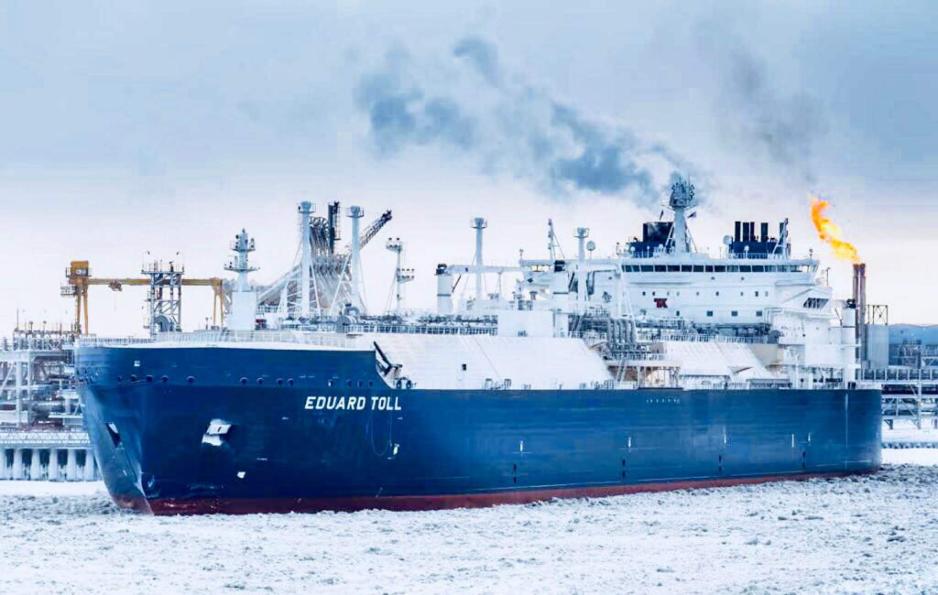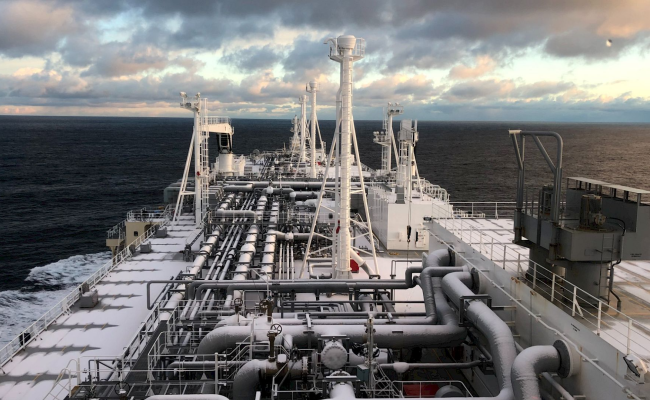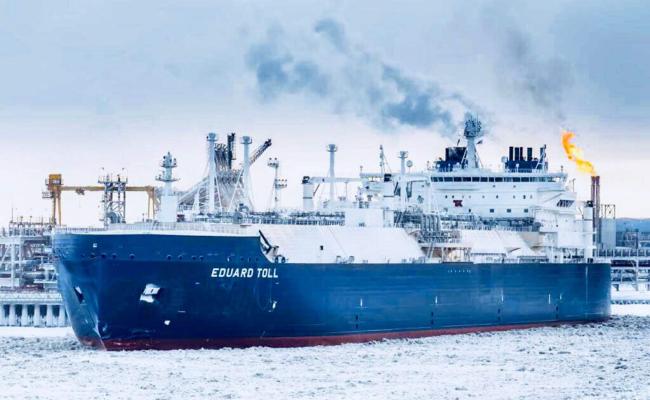UK Maritime Services Ban on Russian LNG Threatens Seapeak’s Arctic Yamal Fleet

Arc7 at Sabetta
The UK maritime services ban will apply to Seapeak Maritime (Glasgow) Ltd., a key provider of shipping services to Russia’s Yamal LNG project, the government confirmed to HNN. Without Seapeak’s six Arc7 LNG carriers the project would face significant logistical challenges. The upcoming EU import ban will further complicate the project’s future.
The UK’s upcoming maritime services ban for vessels carrying Russian liquefied natural gas (LNG) could significantly disrupt the logistics chain of the Arctic Yamal LNG project, new comments by a government spokesperson suggest.
Seapeak Maritime (Glasgow) Ltd., headquartered in Glasgow, may be one of the most exposed parties. The company manages six specialized Arc7 ice-class carriers that shuttle LNG from the port of Sabetta on the Yamal Peninsula.
When the Foreign Office announced the measures last week the impact on UK-based company Seapeak Maritime Ltd. wasn’t immediately clear. The UK government now confirmed to HNN that the ban would end Seapeak’s ability to transport Russian LNG, including for the Yamal project.
Asked if the ban on maritime transport for Russian LNG would extend to Seapeak, a government spokesperson detailed that “the MSB [maritime services ban] means that all UK companies, including Seapeak, will be unable to continue providing these services to Russian LNG cargoes.”
The proposed ban forms part of a broader UK strategy to choke off revenue to Moscow by targeting the logistics underpinning Russia’s LNG exports. Under the new measures, UK firms will be barred from providing key maritime transport and services — such as protection & indemnity (P&I) insurance and brokering — for vessels that carry LNG originating in Russia to third countries.
This is potentially a tricky one
Seapeak manages 40% of Yamal fleet
UK-based company Seapeak Maritime (Glasgow) Ltd., owned by American investment firm Stonepeak, manages six specialized Arc7 ice-class vessels: Eduard Toll, Rudolf Samoylovich, Vladimir Voronin, Georgiy Ushakov, Nikolay Yevgenov, and Yakov Gakkel.
The vessels are under long-term charter to the Yamal LNG project until 2045 and beyond.
While the vessels are registered in the Bahamas they are managed by Seapeak Maritime (Glasgow) Ltd. and revenues are booked in Britain’s financial system. As is common in the international shipping world, ownership and management structures are often complex.
“This is potentially a tricky one. Corporate registration would seem to protect them, but managerial functions are done in [...] Glasgow. If they were to be approached by the UK they would certainly seem to have a deep problem, along with Novatek. But again, it depends on if or how regulators will approach this,” says Kjell Eikland, managing director of data provider Eikland Energy.
Insurance through UK firms
Critically for Seapeak, four of its Arctic tankers are currently insured through UK-based P&I mutuals such as Charles Taylor & Co., while others rely on Nordic firms like Skuld. Cutting off access to UK insurers would force Seapeak to find alternative underwriting.
Also read (the text continues)
While that is not impossible – some industry analysts suggest that operators could lean more heavily on non-UK insurers – such a transition may be costly and time-consuming.
UK ban complicates Arctic logistics
Beyond insurance, the ban raises logistical uncertainties for the project as a whole. Seapeak’s vessels are deeply integrated into Yamal’s supply chain. The EU’s upcoming ban on Russian LNG imports by early 2027 is putting further pressure on the project’s shipping architecture.
Novatek could face serious logistical headaches if Seapeak’s six Arc7 vessels are forced out of the trade. These ice-class carriers play a key role: they are among the few ships capable of navigating the harsh, frozen Northern Sea Route for large chunks of the year.
“Yamal could at least temporarily face a big logistical problem. The import and services prohibition would appear to give Seapeak a Force Majeure excuse with regard to Novatek/Yamal, but Seapeak's financing model and cash flow effects could be catastrophic,” continues Eikland.
Without the vessels, Novatek would either have to rely more heavily on its remaining Arc7 fleet or scramble to find alternative ice-class tonnage, which is both scarce and expensive.
Who could buy these ships and/or take the operational responsibility?
Replacement Arc7-class hulls are difficult to come by; new construction at Russian yards like Zvezda has been delayed under sanctions.
Moreover, Novatek’s existing workaround, transshipping several dozen Yamal cargoes off the coast of Murmansk into conventional carriers, is already showing its limits.
Analysts point out that this process is less efficient, more complex, and lengthens voyage times, driving up costs. If Seapeak were sidelined, scaling that workaround could prove difficult, especially during peak seasonal demand in winter when ice conditions are most challenging.
Could vessels be transferred?
It is plausible the company might try to sell or transfer its Arc7 vessels to a third party that could continue serving Yamal LNG. Given the charter structure with Yamal contracts running through at least 2045, there could be a market for these specialized ships among non-UK operators.
Seapeak did not respond to a request for comment on how the maritime services ban will affect its operations and if it intends to sell its Arc7 vessels.
High-ice vessels are not easily replaced, so they remain valuable. However, any buyer would also have to navigate the same geopolitical headwinds, including insurance, maintenance, and possible secondary sanctions.
“Who could buy these ships and/or take the operational responsibility?,” asks Eikland. If Seapeak were to succeed in offloading the vessels, Novatek could preserve part of its shipping capacity, but the transition would likely be costly, risky, and not guaranteed.



